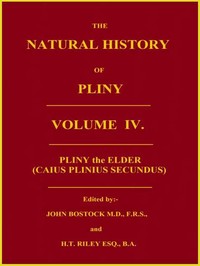The Natural History of Pliny, Volume 4 (of 6) by the Elder Pliny
"The Natural History of Pliny, Volume 4 (of 6)" by the Elder Pliny is a scientific publication written in the 1st century AD. This volume delves into various significant topics related to agriculture, particularly focusing on grain, its cultivation, and the historical practices of the ancients. The work serves as a profound exploration of botany and agricultural theory, underlining the importance of plants in sustaining human life. The opening of this volume
introduces the reader to Pliny's advocacy for understanding and appreciating the earth as a provider of essential nourishment and resources. He highlights the distinction between beneficial and harmful plants, attributing human malice to the misuse of nature's offerings rather than to nature itself. Pliny sets the stage for a detailed examination of grain cultivation, central to ancient Roman life, and discusses historical practices and beliefs surrounding agriculture. He references significant agricultural figures, norms of land ownership, and the importance of grain as a staple in Roman society, portraying the cultivation of grain as both an art and a moral duty of the populace. (This is an automatically generated summary.)
Read or download for free
| How to read | Url | Size | |||
|---|---|---|---|---|---|
| Read now! | https://www.gutenberg.org/ebooks/61113.html.images | 2.2 MB | |||
| EPUB3 (E-readers incl. Send-to-Kindle) | https://www.gutenberg.org/ebooks/61113.epub3.images | 1.2 MB | |||
| EPUB (older E-readers) | https://www.gutenberg.org/ebooks/61113.epub.images | 1.2 MB | |||
| Kindle | https://www.gutenberg.org/ebooks/61113.kf8.images | 1.7 MB | |||
| older Kindles | https://www.gutenberg.org/ebooks/61113.kindle.images | 1.3 MB | |||
| Plain Text UTF-8 | https://www.gutenberg.org/ebooks/61113.txt.utf-8 | 1.3 MB | |||
| Download HTML (zip) | https://www.gutenberg.org/cache/epub/61113/pg61113-h.zip | 608 kB | |||
| There may be more files related to this item. | |||||
Similar Books
About this eBook
| Author | Pliny, the Elder, 24?-79 |
|---|---|
| Translator | Bostock, John, 1773-1846 |
| Translator | Riley, Henry T. (Henry Thomas), 1816-1878 |
| Title | The Natural History of Pliny, Volume 4 (of 6) |
| Note | Reading ease score: 67.7 (8th & 9th grade). Neither easy nor difficult to read. |
| Note | Wikipedia page about this book: https://en.wikipedia.org/wiki/Natural_History_(Pliny) |
| Credits |
Produced by Turgut Dincer, Stephen Rowland, Tony Browne, Brian Wilcox and the Online Distributed Proofreading Team at http://www.pgdp.net (This file was produced from images generously made available by The Internet Archive) |
| Language | English |
| LoC Class | QH: Science: Natural history |
| Subject | Natural history -- Pre-Linnean works |
| Category | Text |
| EBook-No. | 61113 |
| Release Date | Jan 6, 2020 |
| Copyright Status | Public domain in the USA. |
| Downloads | 711 downloads in the last 30 days. |
| Project Gutenberg eBooks are always free! | |


